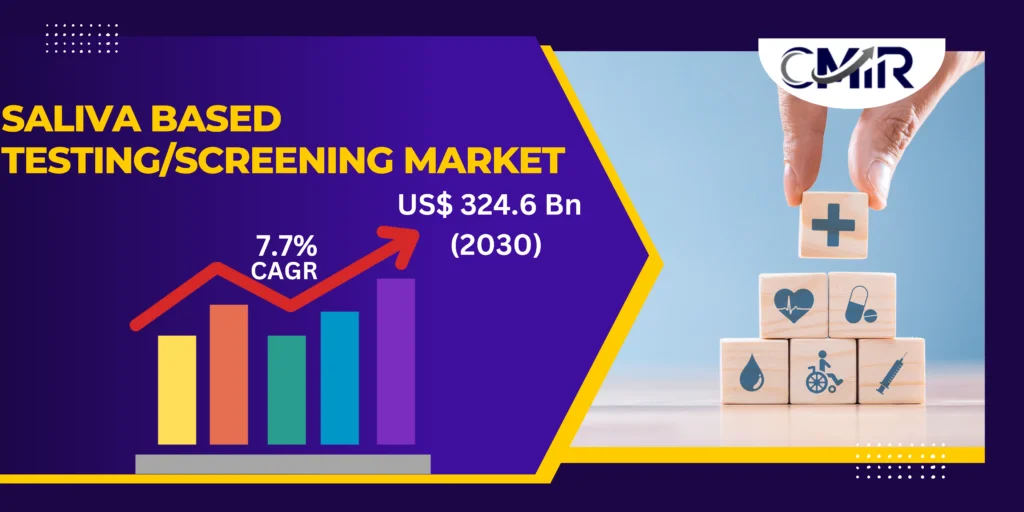-Advertisement=
The global saliva-based testing/screening market refers to the use of saliva samples for diagnostic testing and screening of various diseases and conditions. Saliva-based testing is a non-invasive and simple method of collecting samples for diagnosis, which makes it an attractive option for patients and healthcare providers alike.
Saliva-based testing has been used for several years for various purposes, including drug testing, DNA testing, and HIV testing. However, with the COVID-19 pandemic, saliva-based testing has gained significant attention as a reliable and accessible option for testing for the virus. The market for saliva-based COVID-19 testing has grown rapidly, and many companies and research institutions are now focusing on developing new and improved saliva-based testing methods for COVID-19 and other diseases. The global saliva-based testing/screening market is expected to continue to grow in the coming years, driven by factors such as the increasing demand for non-invasive and easy-to-use diagnostic tests, the growing prevalence of infectious diseases, and the increasing adoption of saliva-based testing by healthcare providers and patients.
The global saliva-based testing/screening market is anticipated to reach US$ 588.2 million by the end of 2030, expanding at a CAGR of 7.7% from 2023 to 2030 (forecast period).
Download Free PDF Sample Research Report @ https://cognizancemarketresearch.com/request/saliva-based-testing-or-screening-market/
-Advertisement=
Global Saliva Based Testing/Screening Market to Recover Amid COVID-19 Pandemic
Saliva-based testing/screening has gained significant attention during the COVID-19 pandemic due to its ease of use, non-invasive nature, and potential for high-throughput testing. The market for saliva-based testing/screening has seen significant growth during the pandemic, as countries and businesses around the world seek to expand testing capabilities and control the spread of the virus.
While the pandemic has caused significant disruptions to global markets, the demand for COVID-19 testing is likely to continue for the foreseeable future, which could provide opportunities for the saliva-based testing/screening market to recover and grow. However, the overall recovery of the market will depend on factors such as the availability of vaccines, the emergence of new variants of the virus, and the regulatory landscape surrounding COVID-19 testing. It is also worth noting that the market for saliva-based testing/screening extends beyond COVID-19, with potential applications in areas such as cancer detection, drug testing, and genetic testing. As such, the long-term growth prospects for the market could be influenced by factors beyond the pandemic.
The market for saliva-based testing/screening is likely to continue to evolve in response to ongoing developments related to COVID-19 and other factors affecting the healthcare industry.

Growing demand for non-invasive and easy-to-use diagnostic tools Boost Global Saliva Based Testing/Screening Market
The growing demand for non-invasive and easy-to-use diagnostic tools is one of the key factors driving the growth of the global saliva-based testing/screening market. Saliva-based testing/screening offers several advantages over traditional diagnostic methods, including ease of collection, reduced risk of exposure to infectious agents, and lower cost. The COVID-19 pandemic has further accelerated the demand for saliva-based testing/screening due to the need for frequent testing and the potential for high-throughput testing to control the spread of the virus. Saliva-based testing/screening has been widely adopted for COVID-19 testing, as it is less invasive and less uncomfortable than nasopharyngeal swabs, and can be easily collected by patients themselves.
The growing prevalence of chronic diseases such as cancer, diabetes, and cardiovascular diseases has also increased the need for non-invasive and easy-to-use diagnostic tools. Saliva-based testing/screening has the potential to provide convenient and accessible screening for these diseases, enabling earlier detection and more effective treatment. In addition, the increasing focus on personalized medicine and the growing use of biomarkers for disease diagnosis and treatment is also driving the demand for saliva-based testing/screening. Saliva-based tests can provide non-invasive and real-time monitoring of biomarkers, enabling earlier disease detection and more targeted treatment.
North America and Europe to Spearhead the Global Saliva Based Testing/Screening Market
North America and Europe are the fastest-growing segments in the global saliva-based testing/screening market due to several factors, including:
- Advanced Healthcare Infrastructure: North America and Europe have highly advanced healthcare infrastructure that enables the adoption of innovative diagnostic tools, including saliva-based testing/screening.
- High Prevalence of Chronic Diseases: Both North America and Europe have a high prevalence of chronic diseases, such as diabetes, cardiovascular diseases, and cancer, which has created a significant demand for non-invasive and easy-to-use diagnostic tools.
- Well-Established Regulatory Environment: The regulatory environment in North America and Europe is well-established and stringent, ensuring that diagnostic tools and medical devices are safe, effective, and reliable.
- Strong Research and Development Activities: North America and Europe have a robust research and development infrastructure, including academia and industry, which drives innovation in healthcare technologies.
- Early Adoption of COVID-19 Testing: Both North America and Europe were early adopters of COVID-19 testing, and saliva-based testing/screening has emerged as an important tool in the fight against the pandemic.
-Advertisement=
